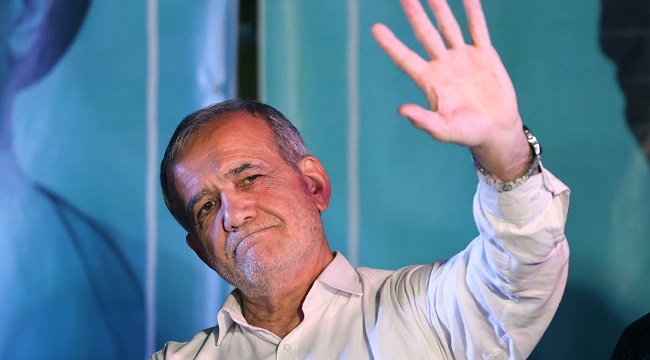With the victory of reformist candidate Masoud Pezeshkian in a runoff presidential election, one can hope for some relief to the people of Iran who are reeling under a radical Islamist regime amid strained ties with the West and heightened tensions with the country’s sworn-enemy Israel. Pezeshkian emerged victorious in Friday’s runoff election by securing 53.6 per cent of the 30.5 million votes counted. This marked a narrow win over the ultra-conservative candidate, Saeed Jalili, who received 44.3 per cent of votes. The runoff was held as no candidate could secure a majority in the first round of election conducted on 28 June which saw the lowest voter turnout ever since the Islamic Republic was established in 1979. The snap-election was necessitated by the death of President Ebrahim Raisi in a helicopter crash in May.
A trained heart-surgeon, Pezeshkian will assume leadership in a country grappling with growing global isolation, domestic restlessness and a deteriorating economy. He rose to prominence due to his vocal opposition to the suppression of the 2009 pro-democracy demonstrations and the brutal crackdown on protesters by the infamous morality police in 2022 following the tragic death of 22-year-old Iranian woman of Kurdish origin Mahsa Amini. Amini died while in custody of the morality police after she was apprehended for failing to comply with the strict dress code imposed on women by the Shiite theocracy. Hundreds lost their lives and thousands were detained as the authorities attempted to quell the uprising.
Pezeshkian, who is fluent in Azeri, Farsi, and Kurdish languages, emphasised reaching out to Iran’s diverse ethnic groups during his campaign. Being the first president from western Iran in years, his election is seen as a potential benefit to the country, as people belonging to the western part, home to several ethnicities and religions, are known for their tolerance.
Experts believe that having a moderate figure in the presidency could help to improve communication between Iran and Western nations. Pezeshkian has expressed his willingness to implement social reforms, including easing of the mandatory headscarf for women, although experts note that such changes are not certain to materialise as it is the Supreme Leader Ayatollah Ali Khamenei who has the final say over all policy decisions. It is precisely for this reason that Western nations do not anticipate a significant shift in their ties with Iran following the election. In the words of a US State Department spokesperson: “We have no expectation these elections will lead to fundamental change in Iran’s direction or more respect for the human rights of its citizens.” Nevertheless, Pezeshkian is seen as a better alternative compared to his hardliner opponent, who, in all likelihood, might have exacerbated the current tensions with Israel and its Western allies. Tensions between Iran and Israel have been fuelled by the recent conflict in Gaza and the progress of Iran’s nuclear programme. Just a few months ago, Iran and Israel engaged in their first armed conflict amid the war in Gaza.
However, with limited powers at his disposal, Pezeshkian altering his country’s current course of relations with Israel and its allies remains an unlikely eventuality.






































